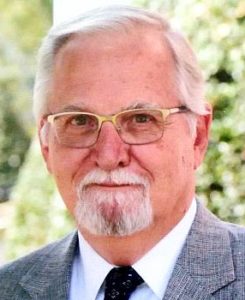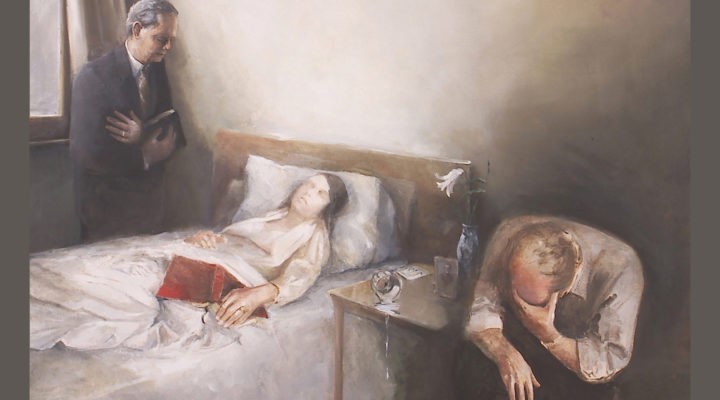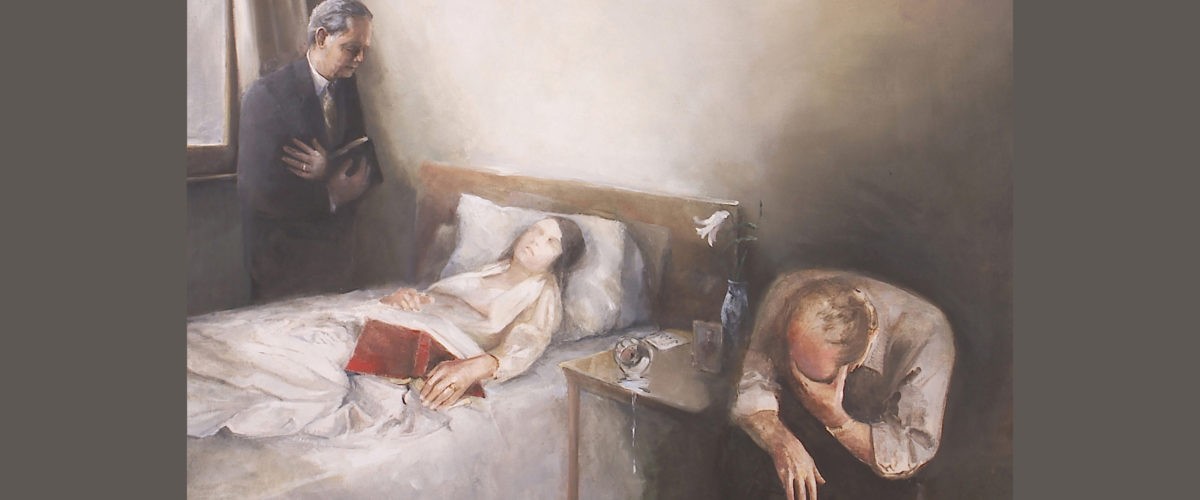The sociologist Peter Berger once said the power of religion rests, ultimately, upon the credibility of the banners it puts in our hands as we walk toward death. A recent brush with death awakened me to the surprising fact that, apart from the funeral hour, Mainline Christians today say very little about this looming certainty.
Perhaps this is due to our cultural avoidance of the subject generally, to the manipulative overuse of death in revivalism, to our current passion for this-worldly justice, or to our pluralistic era’s varied ideas about death. But if Berger is correct, our silence means Mainline Christians have a powerful though neglected banner to advance.

Dan Day
The thick, brick wall of death being a smash-up none of us can evade, we need to speak more clearly and frequently about it and our Christian hope.
The great difficulty we face, however, is Scripture’s slim supply of material on the subject. Death’s certainty is, of course, often acknowledged in the Bible, but information about it and its aftermath is minimal. It is one thing to write of this present life and of experiences we can verify — as is the case for the lion’s share of our Scriptures. It is different, however, to write of a future not one of us has ever seen or experienced.
When the biblical writers speak of “last things” and the hereafter, they typically rely on symbols, poetic figures and newly fashioned terms; a rhetorical tactic that provides little of the specificity we crave. So, in one sense, it is fitting that our churches say little about death and the hereafter; Scripture itself adopts a different voice when it speaks of the hereafter, and this change of voice suggests we also ought to speak with reservation and humility.
Nonetheless, some Christians find a way to speak at great length of the future world; I have on my desk a 492-page book, a recent million-copy seller about heaven telling readers all about heavenly family reunions, puppy praise and the place of technology in heaven. Although the book obviously has been of comfort to many, it is not a book I could write because I doubt we have enough biblical material to authorize such specificity.
It is helpful to differentiate Broadbrush Future talk from Blueprint Future talk. Broadbrush Future talk provides affirmations and directional signals about the unknown future. Blueprint Future talk attempts to provide Google guidance for all our questions and is represented by the heaven book I just mentioned. Broadbrush Future talk rests upon often-repeated biblical themes and assurances, while Blueprint Future talk risks conclusions based upon stray verses or one-off passages from the Bible and creative correlations. Blueprint Future talk often has brought disrepute to the Christian faith by its erroneous date setting and its overly confident charts and diagrams about death and the end of the world.
Here are some aspects of Broadbrush Future talk I judge to be the heart of what we can humbly yet confidently say about the future we may anticipate from God’s hands: the finality of death and the goodness and just-ness of the God who holds the keys of life and death.
The finality of death
Many Christians believe that at the moment of their death their soul slips from the body and makes its flight to the eternal. This understanding finds expression in our speaking of death as a transition, a term that suggests the earthly cocoon is left behind and the butterfly soul is finally released to fly.
“As popular as this view is, it is more a Platonic view of death than a biblical view.”
As popular as this view is, it is more a Platonic view of death than a biblical view. A basic assumption of this Platonic approach is that we have a soul, a spiritual core or a divine spark, something within us that is immortal. Humans, in other words, are more than just physical creatures; we possess a divinity that is imperishable.
A biblical view of humans, however, grants us no such elevated status. (Such special status as we may have is more related to being made in the image of God.) We are creatures of dust, earthly, not possessors of divinity. In this biblical view, we do not have a soul so much as we are a soul — a unique personality, a body-soul unity, an embodied person.
And according to biblical thought, when we die we do not just sluff off our body; rather, this holistic self, this person/body unity actually ceases to live. We wither and perish just like grass and are no more. Yes, the ancient Hebrews imagined there was some kind of “place” where at least a shadow of who we have been still exists, but this hoped-for place (they called it Sheol) was not a happy place. Their view of life after death was far from comforting. It was a shadowy hope amid a dark background. (Besides, Sheol is a part of Hebrew imagination, not Christian teaching.)
So, in Christian thought there is an ending. We are finite creatures made of dust, a part of God’s created world, and we will die just as surely and completely as the cattle or the flowers of the field. There is no spiritual, divine aspect of us that slips out the back door and makes its way to realms eternal. No, when we die, we really die.
Why this brutal ending, this cruel termination? The story of Adam and Eve reports that God’s warning word to the originating pair was not to eat from the Tree of Life or “you will die.”
This is a declaration that life is to be found only in God and that death will follow any attempt to grasp life from any other source. Or, as Paul tersely puts it, “The wages of sin is death.” So the scene presented to us is that human dying was not within God’s original intent. God did not make us for death.
“This is a declaration that life is to be found only in God and that death will follow any attempt to grasp life from any other source.”
Rather, humankinds’ turning to life systems other than to God occasions death in multiple forms, physical death being the most visible and troubling form. Through our own mistrust and disobedience to God, death has entered our world, stalking and finally claiming us as participants of and within a world that long, long ago chose self-assertion over trust in God.
Death as a consequence of sin marks not only our lives; it also marked the life of Jesus. In becoming human for our sakes, he thereby submitted himself to the experience of human death, to die as we die. The significance of his death therefore is not just the fact of it, but that he willingly died with and for us; God in Christ suffered our judgment.
Identifying with us in this most devastating, intimate way, Jesus, in his trusting death, carried us with him in his death and burial, and through his resurrection he lifts all of us to eternal life.
In Christ all is put to death; in Christ all is raised to new life. His opened tomb opens up a second creation which we may enter through obedient trust, a new creation in which death’s supremacy is broken. In our baptism, we wordlessly accept our death (and his) and also receive a foretaste and pledge of the gift of resurrection.
The goodness and just-ness of God
So, although Christianity’s grim view of death denies the softer transition we seek, it offers a transformation of wonder and surprise through the promise of resurrection. With this word, Christian faith moves from darkness to light, from judgment to God’s astonishing goodness.
This word “resurrection,” connoting a stunning reversal rather than a gentle change, does two things.
First, it points to the resurrection of Jesus as the historical nexus of any kind of life after death. A beginning-again point occurs in the resurrection of Jesus.
Second, it underlines that although death is the universal wages of sin, the gift of God is eternal life through Jesus Christ our Lord.
“Resurrection is not, in other words, part of the natural order.”
Resurrection is not, in other words, part of the natural order. It is not akin to springtime flowers’ triumph over wintry soil, a cyclical blooming of dormant bulbs. No, it is a gift, a unique and specific act of God that eviscerates death. And it comes as much of an intruder as does death. But this intruder is a holy gift, God’s gift that stands up to the ugly, bullying intruder death and breaks its grip upon us. Resurrection is a grace gift of God through Christ.
In another sense, this resurrection has its basis in the just-ness of God. Resurrection is the assurance that even if “the wicked” die unscathed, there is still a just God to be faced after physical death. And it is also the pledge that if life has been cruelly unjust, the just God of Scripture will rectify life’s inequities.
According to Scripture, it is appointed for us once to die — but after this, there is judgment. Now, if one is to face judgment after dying, some kind of life after death is presupposed. As in Adam, all die, even so in Christ shall all be made alive — as a gift, and as an assurance that every human ultimately will deal with a God of love and justice.
Moreover, what is resurrected is not a ghostly spirit remnant of the person we once were. The Apostles’ Creed speaks of “the resurrection of the body” as an insistence that it is the holistic person, not just a spirit, who is resurrected. Paul says these bodies will be “spiritual” bodies, a term packed with mystery as well as with the conviction that we shall not simply be unrecognizable spirits in God’s after-death creation.
An avalanche of questions flows from these Broadbrush Future talk claims. Many of them concern the sequence of after-death events, but replying to them requires us to enter Blueprint Future talk, using time-oriented concepts to speak of time-free occurrences.
“Under these banners, every Sunday becomes an Easter anniversary and an anticipation of the promised triumph of God’s death-defeating grace.”
Hence, for some questions we have credible answers, but many more answers remain hidden within the mystery of the resurrection. But even this primal core provides enough substance to place a worthy banner in our hands as we walk inevitably toward our death. Under these banners, every Sunday becomes an Easter anniversary and an anticipation of the promised triumph of God’s death-defeating grace. Under these banners, our fear of death can diminish and quiet, grateful confidence can calm us as we near the river.
I cannot expect all readers to agree with all I have said. But I hope we might agree that these Broadbrush Future talk beliefs, as a minimum, are to be radiantly celebrated in our funeral services. These services ought to bear witness not just to God’s work in the life of the deceased but also to God’s deed in Christ, our abiding hope.
Certainly, love demands we gratefully remember our deceased brothers and sisters. But faith also calls us to speak joyfully of our lively and life-giving Savior. And hope summons us to raise his resurrection banners high, a witness to a gospel and to a God who enfolds all of us and all of life’s events in amazing grace.
J. Daniel (Dan) Day is pastor emeritus of First Baptist of Raleigh, N.C., and former professor of worship and preaching at Campbell University’s Divinity School. His latest book, At The River I Stand: Conversations with God about Dying and Living, offers some of his prayer thoughts after being diagnosed in 2021 with stage four prostate cancer.
Related article:
7 tips on giving that eulogy, when the time comes | Opinion by Mark Wingfield


